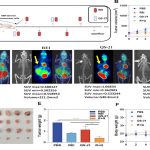
Eygeris, Y., et al. Exploring the potential of saponins as adjuvants in lipid-nanoparticle-based mRNA vaccines.
Eygeris, Y., et al. Exploring the potential of saponins as adjuvants in lipid-nanoparticle-based mRNA vaccines. Mol Ther Methods Clin Dev, 2025 May 21, 33(2):101495. PMID: 40525124
- This study explores the inclusion of saponins, which are naturally occurring amphiphilic phytocompounds known for their surface-active and membrane-disrupting properties, in lipid nanoparticle (LNP) formulations used for mRNA vaccine delivery. By leveraging their unique structural characteristics, the researchers aim to improve the intracellular delivery of mRNA by promoting endosomal escape, thereby increasing transfection efficiency. Additionally, the study investigates the potential of saponins to act as adjuvants that can modulate and enhance the immune response, potentially leading to more effective and balanced vaccine-induced immunity. This approach seeks to address current challenges in mRNA vaccine technology, such as limited transfection efficiency and immune response bias, by integrating naturally derived compounds into existing delivery systems.
- Among 40 screened saponins, quillaic acid and macranthoidin B were identified as particularly effective in increasing endosomal disruption and transfection efficiency. The results indicate that saponin-loaded LNPs, particularly those containing quillaic acid (Q LNPs), elicit a more Th1-biased immune response compared to control LNPs. After a prime-boost regimen with OVA mRNA, Q LNPs significantly increased the IgG2a/IgG1 ratio, reflecting a stronger Th1 response, which is associated with cellular immunity. Additionally, all treatments elevated immunoglobulin levels (IgG, IgG1, IgG2a) compared to baseline, with higher responses after the second dose.
- The research demonstrates that incorporating saponins into LNPs has potential as natural adjuvants to balance immune responses and improve the efficacy and safety profile of mRNA vaccines. The results suggest that these saponin LNPs could promote a more cell-mediated and potentially less allergic response, making them promising adjuvants for vaccines targeting intracellular pathogens, and may potentially reduce adverse effects, such as vaccine-associated enhanced respiratory disease (VAERD).
Click here to access the full scientific paper.
Recent Posts




